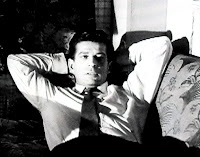 In an impressive opening sequence with a jazzy score and a film noir feel, con man George Nader escapes from a British prison using explosives smuggled up to him by rope and arrives at a flat which his buddy Bernard Lee has gotten for him while its owner is away. In a flashback, we see how Nader, young and charming, scammed an older woman out of a collection of rare coins, sold them and put the money in a safe deposit box, and allowed himself to be caught, thinking that because he's American and a first-time offender, he'd get a light sentence. Instead he gets ten years, hence the breakout. Nader goes to retrieve the money but is scared away by a policeman. He wants more help from Lee, but Lee wants a bigger cut of the money. Meanwhile, a lovely young woman (Maggie Smith) shows up looking for the owner of the flat. In the way of such ventures, nothing goes right for Nader: there’s a double cross and a death, and then, because of the headlines over the death, the underworld figures that might help Nader give him the cold shoulder. The only person left is Smith who eventually figures out that Nader is in big trouble, but she's fallen for him so she takes him out to the country to stay with her family. Unfortunately, even out there on a farm, Nader winds up with nowhere to go.
In an impressive opening sequence with a jazzy score and a film noir feel, con man George Nader escapes from a British prison using explosives smuggled up to him by rope and arrives at a flat which his buddy Bernard Lee has gotten for him while its owner is away. In a flashback, we see how Nader, young and charming, scammed an older woman out of a collection of rare coins, sold them and put the money in a safe deposit box, and allowed himself to be caught, thinking that because he's American and a first-time offender, he'd get a light sentence. Instead he gets ten years, hence the breakout. Nader goes to retrieve the money but is scared away by a policeman. He wants more help from Lee, but Lee wants a bigger cut of the money. Meanwhile, a lovely young woman (Maggie Smith) shows up looking for the owner of the flat. In the way of such ventures, nothing goes right for Nader: there’s a double cross and a death, and then, because of the headlines over the death, the underworld figures that might help Nader give him the cold shoulder. The only person left is Smith who eventually figures out that Nader is in big trouble, but she's fallen for him so she takes him out to the country to stay with her family. Unfortunately, even out there on a farm, Nader winds up with nowhere to go.Though not a masterpiece, this is a nice example of latter-day film noir. Nader (pictured) is good playing a bad guy who has few redeeming qualities, yet for whom we still have some sympathy. His surface charm feels exactly that—only on the surface—but we still keep holding out hope that he'll get free and straighten up. Maggie Smith, in her first movie and at only 24, looks impossibly young, and plays her character with a nice mix of innocence and guile. Lee, famous as M in the earlier James Bond movies, is fine as the greedy friend. The movie looks great with superbly crisp black & white cinematography; the first half is fairly well paced, but the second half drags, partly because nothing can match the exciting opening scene. Good jazz score by Dizzy Reece. [TCM]

No comments:
Post a Comment